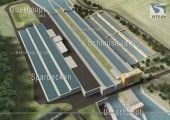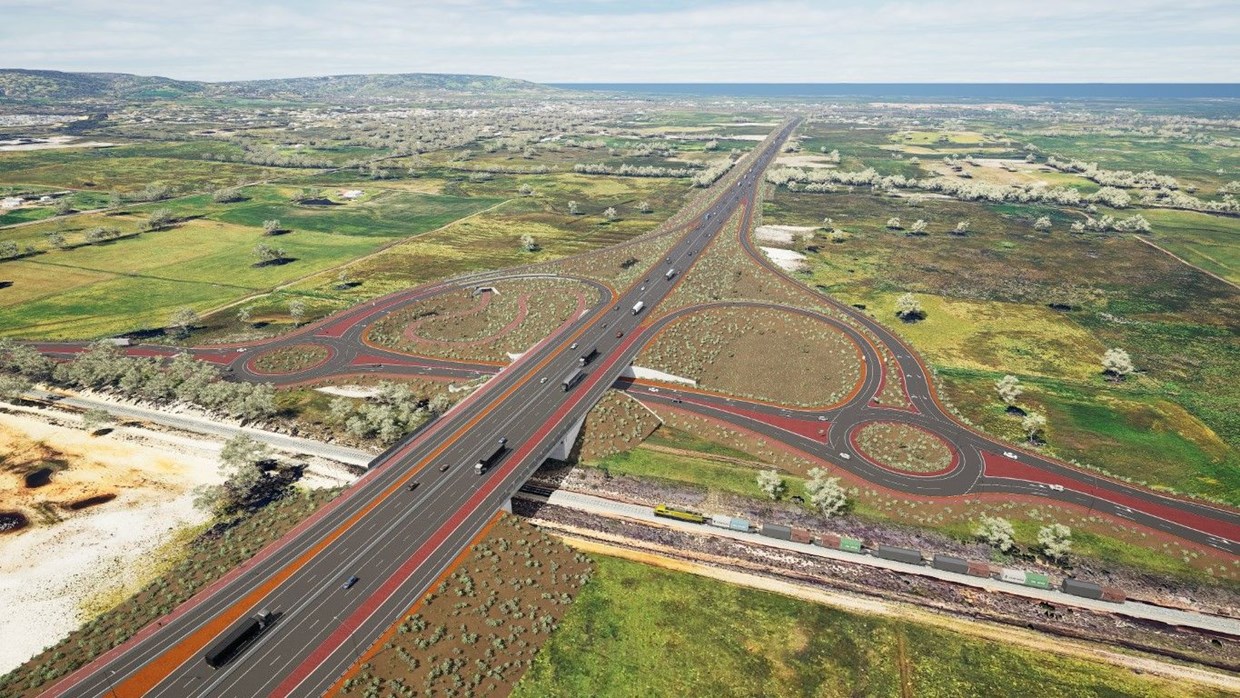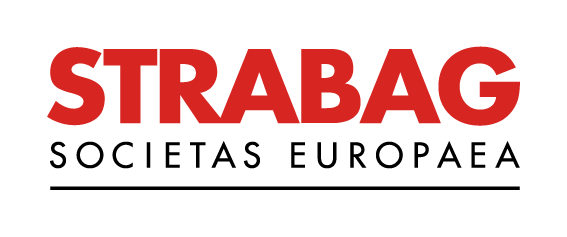Key developments
STRABAG participating in Lueg Bridge replacement
January 2025 | Segment South + East
_width-1240.jpeg)
© ASFINAG
STRABAG, in a joint venture with PORR, has secured a € 217 million contract to completely replace the Lueg Bridge on the Brenner motorway in Tyrol, Austria. After 55 years of intensive use, one of Austria’s busiest traffic arteries has reached the end of its service life. Due to its steep hillside location and the complexity of the construction work – including piers up to 60 metres tall – the project is considered especially challenging. Careful planning and the use of state-of-the-art construction methods should ensure completion by the end of 2030.
STRABAG takes on northern section of Emonika project in Ljubljana
January 2025 | Segment South + East
_width-1240.jpeg)
© Mendota Invest
Mendota Invest has commissioned STRABAG as the general contractor for the northern section of the multifunctional Emonika complex in the Slovenian capital. With its strategic location and innovative, sustainable design, the project aims to establish Emonika as a major commercial and community hub – one that will help shape Ljubljana’s skyline and enhance daily life for its residents. The contract includes three residential buildings, retail areas, a hotel, an office tower and an underground car park. The contract volume exceeds € 80 million, with completion planned within three years.
STRABAG subsidiary wins major contract to build 561 homes in Amsterdam
February 2025 | Segment North + West
_width-1240.jpeg)

© Powerhouse Company (Parkside) / Rijnboutt (Hillside and Brightside)
The Dutch STRABAG Group company is set to deliver a large-scale residential project in Amsterdam by 2028, with a contract volume of approximately € 139 million. The development comprises 561 family-friendly units, including social housing, mid-range rental flats and free-market apartments – helping to ease pressure on the city’s tight rental market. Featuring a thermal energy storage system, rooftop solar panels and smart rainwater management, the buildings will achieve A++ energy efficiency and aim for a BREEAM “Excellent” rating for operations.
Stefan Kratochwill new CEO of STRABAG SE
February 2025
_width-1240.jpeg)
© STRABAG
On 19 February 2025, the Supervisory Board appointed Stefan Kratochwill as CEO of STRABAG SE. A graduate in industrial engineering, Kratochwill joined the company in 2003 as a trainee and most recently served as Head of Central Division and Managing Director of the construction equipment subsidiary BMTI. In that role, he oversaw the Group’s fleet of construction machinery – valued at over € 4.5 billion – and around 3,000 employees in 20 countries. The transition to climate-friendly machinery and vehicles is one of the key levers for achieving the Group’s goal of climate neutrality by 2040. Kratochwill played a major role in shaping the 2030 Strategy and will continue to drive it forward with a clear focus on innovation, sustainability and leadership. Dr. Hans Peter Haselsteiner, who transformed STRABAG into an international group during his tenure as CEO, was reappointed General Representative of STRABAG SE in January 2025 and will continue to serve the Management Board in an advisory capacity.
STRABAG successfully completes closing of the Georgiou Group
March 2025 | Segment International + Special Divisions

© Georgiou Group
In March 2025, STRABAG completed the 100% acquisition of the Australian Georgiou Group, based in Perth. The company is recognised as an experienced infrastructure specialist that has successfully delivered numerous large-scale projects. Since February, the company has been part of the Tonkin Extension Alliance commissioned by the Department of Main Roads Western Australia to extend the Tonkin Highway and widen Thomas Road in Perth. The project, worth a total of AUD 1 billion (around € 563 million), involves extending the four-lane Tonkin Highway over 14 kilometres and widening Thomas Road over a length of 4.5 kilometres. The work is being carried out in collaboration with BMD Construction, Civcon, GHD and BG&E. Completion is scheduled for 2028.
Successful refinancing and expansion of existing credit facilities
June 2025

STRABAG has refinanced both a syndicated guarantee facility and a syndicated cash credit facility. The guarantee facility was increased from € 2.0 billion to € 2.5 billion and the cash credit facility from € 0.4 billion to € 0.5 billion. The expansion of both credit facilities reflects the company’s growth in recent years and its strategic planning under Strategy 2030. For the 2025 financial year, STRABAG expects output of around € 21 billion – representing more than 25% growth since the last refinancing in 2019. The credit facilities have a term of five years, with two one-year extension options, thus providing long-term support for STRABAG SE’s solid financing structure and continued growth.
Engineering feat: Rinsdorf viaduct including piers and foundations moved into place
June 2025 | Segment North + West
_width-1240.jpeg)
© Autobahn Westfalen
In a first for Germany, the new Rinsdorf viaduct on the A45 motorway was slid into its final position – a technical milestone. Using 24 hydraulic presses and Teflon sliding bearings, the 485.5-metre-long, 40,000-tonnes bridge segment was precisely moved over a distance of around 20 metres. With this feat, STRABAG once again demonstrated its technological leadership, showing how innovative construction methods and top-tier engineering are helping to modernise Germany’s infrastructure in a sustainable way.
Modernisation of Czech railways: STRABAG Rail wins contracts worth approx. € 360 million
June 2025 | Segment South + East
_width-1240.jpeg)
© Správa železnic, státní organizace (staatliche Eisenbahnverwaltung)
With two major EU-cofinanced projects in the Czech Republic totalling around € 360 million, STRABAG Rail is contributing to the sustainable modernisation of the national railway infrastructure. The projects include the upgrade of the Nezamyslice–Kojetín line between Brno and Přerov into a high-speed connection as well as the complex modernisation of the Česká Třebová rail hub – both key steps in improving trans-European transport links. STRABAG Rail has long been a reliable partner for efficient, accessible and sustainable mobility in Europe and plays a central role in the forward-looking development of the continent’s rail infrastructure.
STRABAG signs agreement to acquire WTE
June 2025 | Segment International + Special Divisions
_width-1240.jpeg)
© nblxer/stock.adobe.com
On 10 December 2024, STRABAG SE announced an agreement with the previous owner, EVN AG, to acquire WTE Wassertechnik GmbH. The purchase agreement was signed on 18 June 2025 and closing is expected within the next six months. The purchase price for the shares in WTE amounts to € 100 million; existing shareholder loans will be taken over as well.
The acquisition, which is in line with the objectives of Strategy 2030, expands STRABAG’s water technologies business to include integrated water management solutions. The combined portfolio in this segment is expected to generate annual output of € 400 million. So far this year, STRABAG has already made its mark in the water sector with a contract for a water treatment plant in Split, Croatia, and as part of a consortium for the UK’s Haweswater Aqueduct Resilience Programme (HARP), which involves upgrading a 110-kilometre water pipeline system by replacing six tunnel sections totalling around 50 kilometres. The contract covers the finance, design, build and 25 years of maintenance.
Technology and sustainability at STRABAG: two sides of the same coin
_width-1240.jpeg)
© STRABAG
The construction industry is going climate-smart. On Austria’s A2 motorway, STRABAG is using 70% recycled asphalt and energy self-sufficient construction sites. In Vienna, a test lab is trialling alternative sustainable materials such as clay, straw and sheep’s wool under real conditions. In Hamburg, a pilot project is under way with a fully electric wheel loader – a milestone for emissions-free site logistics. Meanwhile, a new value stream management site in the port of Neuss is being built to recycle up to 250,000 tonnes of mineral construction materials per year. These projects show how technological innovation, circular economy principles and sustainable materials go hand in hand. The results: more efficient processes, lower emissions, careful use of resources – and a clear step towards climate neutrality by 2040.